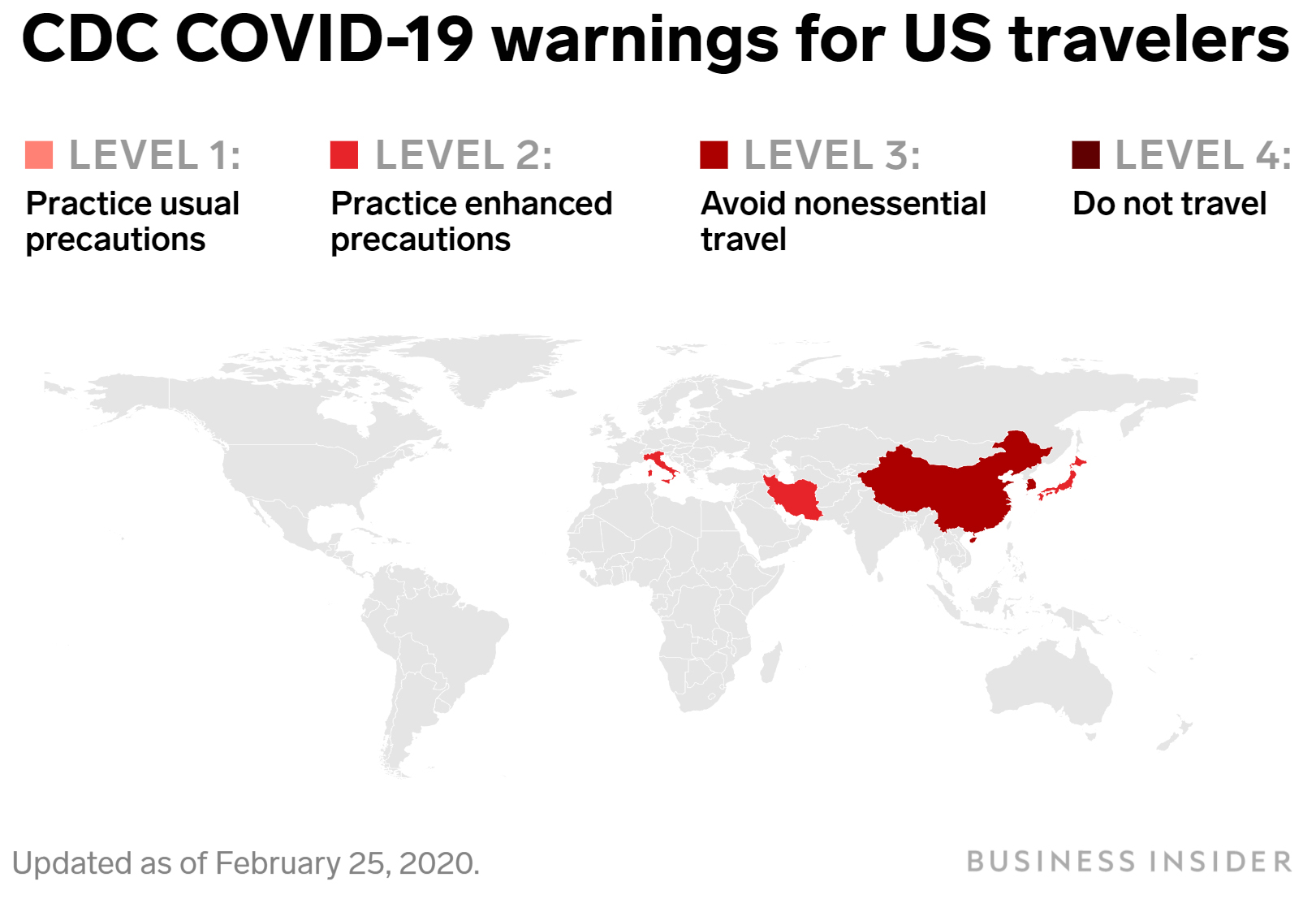The US State Department and the Centres for Disease Control and Prevention have issued travel notices to inform Americans about health problems that might affect their safety abroad.
Because of the outbreak of the novel coronavirus, both government agencies have issued multiple health warnings for affected countries. As of Monday, cases of the virus had been reported in more than 30 countries, with China hit the hardest.
The US State Department uses four levels of safety guidance to let Americans know what to expect from travelling to affected countries, from Level 1: Exercise normal precautions to Level 4: Do not travel. The CDC's guidelines range from Level 1: Practice usual precautions to Level 3: Avoid all nonessential travel.
Here are travel precautions and guidelines the US government has issued for countries affected by the coronavirus.
Cases of the novel coronavirus have been reported in more than 30 countries.
IF travelling to any areas where disease transmission is present, the CDC recommends that Americans:
- Avoid sick people
- Try not to touch your eyes, nose, or mouth without washing your hands
- Wash your hands often
The following countries and territories had increased guidance from the CDC over the coronavirus as of Tuesday, February 25:
- China (Level 3)
- South Korea (Level 3)
- Japan (Level 2)
- Italy (Level 2)
- Iran (Level 2)
- Hong Kong (Level 1)
The CDC cautions that any travellers returning from one of these areas who feel sick with a fever, cough, or shortness of breath should immediately seek medical help, call ahead before going to the doctor, avoid travel, avoid contact with others, and exercise increased sanitation.

The following countries or territories have reported cases of the coronavirus but have not been issued CDC travel notices over them:
- Afghanistan
- Australia
- Bahrain
- Belgium
- Cambodia
- Canada
- Egypt
- Finland
- France
- Germany
- India
- Iraq
- Israel
- Kuwait
- Lebanon
- Malaysia
- Nepal
- Oman
- Philippines
- Russia
- Singapore
- Spain
- Sri Lanka
- Sweden
- Taiwan
- Thailand
- United Arab Emirates
- UK
- US
- Vietnam
In some cases, the US embassies in these places have issued further guidance. You can check for that on the State Department's website, and some alerts are linked above.
Furthermore, the CDC "recommends that all travellers reconsider cruise ship voyages to or within Asia."
Some cruises have had their itineraries changed or cancelled.
You can find out if your cruise has been affected by the coronavirus by checking social media, your cruise line's website, or your email. Business Insider's Mark Matousek compiled full instructions.
The CDC issued its highest health notice for mainland China (Level 3: Avoid nonessential travel).
Because of widespread transmission of the novel coronavirus in China, the CDC and US State Department recommend that travellers avoid all travel to the country.
The US State Department encourages any Americans in China to depart the country by commercial means and recommends that US citizens remaining in China spend as much time as possible at home and away from public gatherings.
At least 73 airlines have cancelled flights to China amid coronavirus fears, and the US government evacuated some US citizens from the country.
The White House has barred foreign nationals who have been to China in the past 14 days from entering the US, is quarantining Americans who recently travelled to China's Hubei province, and is asking Americans who visited other parts of China to "self-quarantine."
The CDC warns that older adults and people with chronic medical conditions have an increased risk of the disease. Furthermore, the agency has outlined that those arriving in the US from China will undergo health screenings and that travellers who have been to China within the past 14 days must enter through specific airports and participate in monitoring by health officials until 14 days after they left China.
By February 24, China had reported more than 77,000 cases and at least 2,500 deaths from COVID-19, the disease caused by the novel coronavirus.
The CDC also issued its highest health notice for South Korea.
The CDC warned Americans to avoid travelling to South Korea, which has seen a particularly high transmission of the coronavirus. It warned that older adults and those with chronic medical conditions could be at risk of severe symptoms from the virus.
The State Department also warned: "If suspected to have coronavirus in South Korea, you may face travel delays, quarantine, and extremely expensive medical costs."
By February 24, South Korea had reported more than 800 cases and eight deaths from the disease.
The CDC issued its next-highest level for Japan (Level 2: Practice enhanced precautions).
The CDC and the US State Department warn that Japan is experiencing an increase in transmission of the coronavirus and recommend that older adults and people with chronic medical conditions should consider postponing nonessential travel.
By February 24, Japan had reported more than 150 cases and one death from the disease.
The CDC also issued its lowest threat for Hong Kong.
The CDC does not suggest travellers cancel or postpone trips to Hong Kong at this time, listing it as its lowest "watch" level.
The US State Department reported that in early February the Hong Kong government began enforcing a 14-day quarantine for anyone arriving in Hong Kong who had visited mainland China within the previous two weeks.
By February 24, Hong Kong had reported 79 cases and two deaths from the disease.
 A girl on a bus in Hong Kong, January 25. (Achmad Ibrahim/AP)
A girl on a bus in Hong Kong, January 25. (Achmad Ibrahim/AP)
The CDC has also issued its lowest threat for Iran.
The number of coronavirus cases in Iran has increased recently, but the CDC lists the country as threat Level 1 and does not recommend cancelling or postponing travel to the country.
At the same time, however, the US State Department classifies Iran as a Level 4: Do not travel because of what it says is a high risk of kidnapping, arrest, and detention of US citizens.
The US government does not have formal diplomatic relations with Iran and says it is therefore unable to provide emergency services to US citizens and strongly recommends avoiding travel to the country.
By February 24, Iran had reported 61 cases and 12 deaths from the disease.
This article was originally published by Business Insider.
More from Business Insider:
